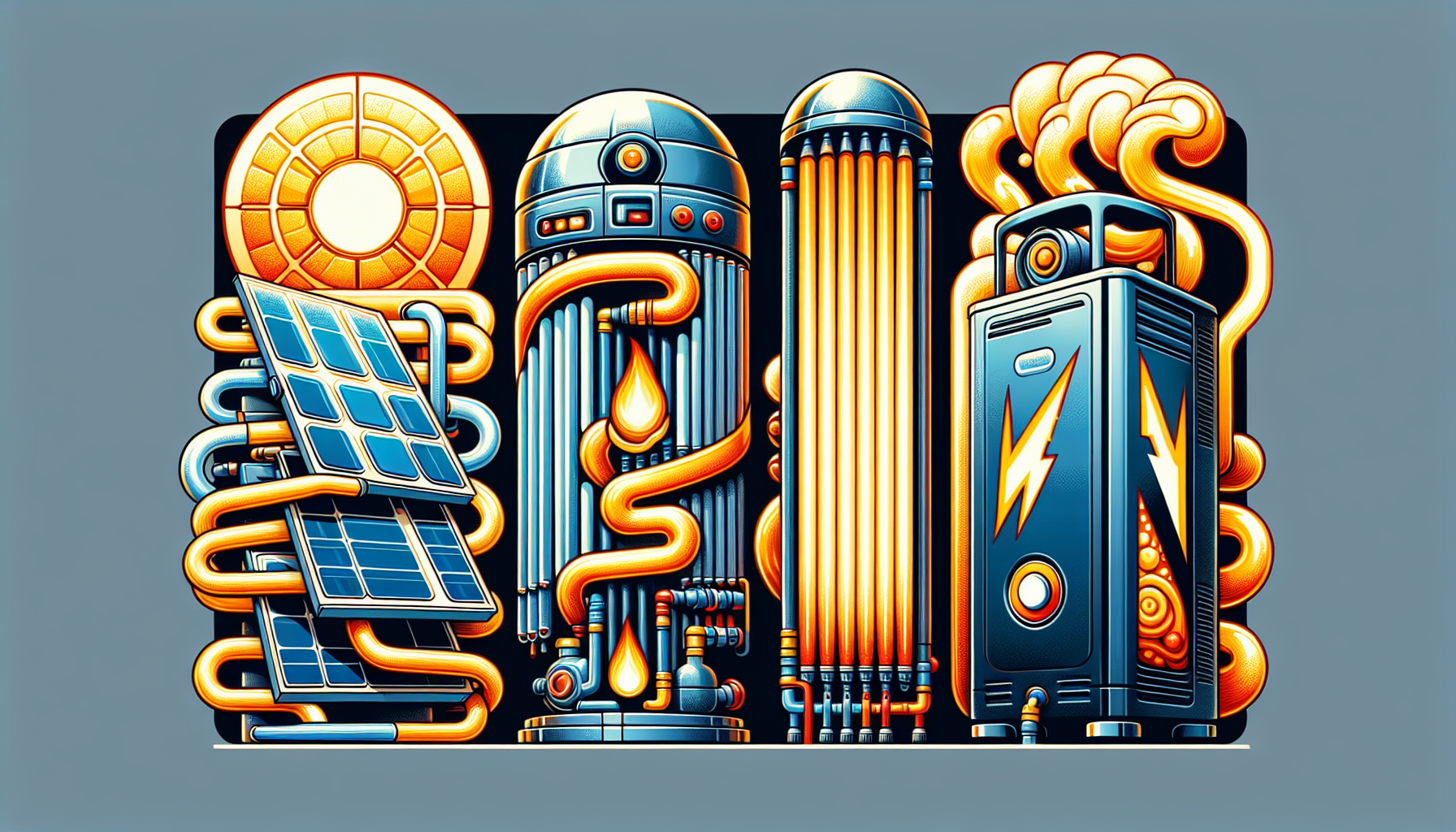What Is the Best Hot Water System for a Family? - Your Ultimate Guide
Seeking the answer to “what is the best hot water system for a family?” is about finding the right fit for your home’s hot water demand, lifestyle, and budget. This article will directly address the considerations essential to making an informed decision, including system types, costs, and performance, to seamlessly integrate into your family’s routine.
Key Takeaways
-
Determining the best hot water system requires evaluating your family’s daily usage, peak times, and sizing the system appropriately to ensure efficiency and cost-savings.
-
Various hot water system types exist, each with different costs and benefits; solar systems offer long-term savings, heat pumps are energy-efficient, and gas and electric systems suit immediate budget and availability needs.
-
Installation considerations, long-term cost effectiveness, potential rebates, and the choice of a reputable supplier are critical factors in enhancing the performance and efficiency of your hot water system.
Determining Your Family's Hot Water Needs

Before you start exploring the various hot water system options, you should first understand your unique needs. After all, the best hot water system for you is the one that’s tailored to your family’s daily usage, peak hot water times, and perfectly sized to ensure efficiency and cost-effectiveness.
The next sections will help you evaluate your family’s daily water consumption, identify peak usage times, and determine the appropriate size for your hot water system. This foundational understanding will pave the way towards making an informed decision on the type of hot water system that’s best suited for your family.
Assessing Daily Hot Water Usage
The first step is to determine your family’s daily hot water usage, which depends on how efficiently you heat water for various household activities such as:
-
Showering
-
Dishwashing
-
Laundry
-
How many times you wash your hands
Take a moment to consider your family’s daily routines. How many showers are taken in a day? How often do you run your dishwasher or washing machine? These factors contribute to your overall hot water consumption and will help you make an informed decision when choosing the right hot water system to meet your family’s needs.
Peak Hot Water Times
With a clear understanding of your family’s daily hot water consumption, we can now examine peak usage times. These are periods during the day when the demand for hot water in your home is at its highest. For some, it might be the morning rush when everyone is getting ready for the day. For others, it could be in the evening when dinner dishes are being cleaned.
Recognizing these peak times is key to selecting a hot water system that can effectively cater to your family’s demand. With the right system, you won’t have to worry about running out of hot water in the middle of your shower or while washing dishes after a family dinner.
Sizing the Right Hot Water System
With an understanding of your daily usage and peak hot water times, the next step is to consider the size of your hot water system. Size matters when it comes to efficiency and cost-effectiveness. A system that’s too small may result in frequent hot water shortages and increased utility expenses, while a system that’s too large could lead to unnecessary installation and operational costs.
The sizing of your hot water system depends on whether you’re considering a storage tank system or a continuous flow system. For instance, storage tank systems, such as a gas hot water system, are sized based on the number of people in your home who require regular access to hot water. Continuous flow systems are sized based on the number of hot water outlets in your home. This ensures that they can meet the demand for hot water throughout the household.
The Battle of Hot Water Systems: Which One Reigns Supreme?

Having covered the basics of understanding your hot water needs, we can now proceed to explore the different types of hot water systems. From solar hot water systems that harness the power of the sun, to heat pump water heaters that extract heat from the surrounding air, to the more traditional gas and electric systems, each comes with its pros and cons.
The upcoming sections will provide detailed information about these different systems. We’ll discuss their working principles, running costs, and the factors to consider when choosing between them. By understanding these systems’ features and functionality, you’ll be better equipped to choose the one that’s the perfect fit for your family.
Solar Hot Water Systems
First on the list are solar hot water systems. As the name suggests, these systems harness energy from the sun to heat your water. But how do they work exactly? A solar hot water system absorbs energy from the sun’s rays in roof-mounted solar collectors, which is then transferred to heat your water.
What sets solar hot water systems apart is their eco-friendliness and cost-effectiveness. While the initial cost can range from $3,000 to $8,000 depending on the specific system and installation requirements, solar hot water systems typically have the lowest running costs for households in the long run. This makes them an excellent option if you’re looking to go green and save on energy costs simultaneously.
Heat Pump Water Heaters
Moving on, we will discuss heat pump water heaters and heat pumps. These systems are notable for their energy efficiency. They function by extracting heat from the surrounding air and transferring it to the water in a storage cylinder through a heat exchanger, essentially functioning as air-sourced solar heaters.
While they are typically more expensive upfront than traditional electric systems, the savings in your electricity bill can quickly offset this initial cost. Heat pump water heaters consume considerably less electricity, leading to cost savings. Moreover, when combined with a rooftop photovoltaic system, they can optimize energy consumption by using excess solar power, reducing your electricity export to the grid.
Gas Hot Water Systems vs Electric Hot Water Systems
Now, let’s focus on the more traditional gas and electric hot water systems. Both systems have their advantages and drawbacks, and choosing between them depends on various factors like availability, cost, and efficiency.
Gas hot water systems are known for their fast heat recovery time, which contributes to their high efficiency. This makes them a more economical option when compared to electric hot water systems. In fact, many consider gas systems to be an efficient hot water system. However, electric systems may be more affordable to install initially and could be the best choice if natural gas isn’t available in your area.
Installation Insights: Where to Place Your Hot Water System

Selecting the right hot water system is only part of the job. The next key consideration is the installation process. The placement of your hot water system can have a significant impact on its performance. It’s essential to consider the space requirements based on the type of system and whether it’s installed indoors or outdoors.
The following sections will cover the advantages and disadvantages of outdoor versus indoor installations, while also discussing the importance of space requirements and safety during the installation process. With these insights, you will be better equipped to decide on the best location for your hot water system.
Outdoor vs Indoor Installation
Several factors will influence whether you install your hot water system indoors or outdoors. An indoor installation offers protection from the weather and typically involves lower initial costs. On the other hand, outdoor installations provide better ventilation and improve safety by reducing flammable vapor concentrations.
However, not all systems are designed to be installed outdoors. For instance:
-
Electric systems can be installed indoors
-
Gas systems require an indoor chimney or flue
-
Solar systems need north-facing roof space for proper panel installation
It’s crucial to consider these factors when deciding where to place your hot water system.
Space Requirements and Safety
Beyond deciding on the location of your hot water system, it’s imperative to ensure there’s enough space for installation and maintenance. The recommended space requirement for installing a hot water system is at least 12 inches of air space around the system on all sides.
Safety is another consideration that shouldn’t be overlooked. If you’re planning to install your hot water system in a confined space, it’s crucial to follow the recommended safety measures. For instance, you should consider installing an instant/online water heater in an open space where the indicator on the heater is visible for monitoring its status.
Cost Considerations for Long-Term Savings

While the initial cost of a hot water system is an important factor, it’s just as important to consider the long-term running costs. The most cost-effective hot water system in the long run isn’t necessarily the one with the lowest upfront cost.
The following sections will compare the initial and running costs of different systems. We’ll also discuss the available rebates and incentives that can help you save on costs. By considering both the upfront costs and long-term running costs, you can make an informed decision that will provide you with the most value over time.
Initial Cost vs Running Costs
When comparing the initial cost and running costs of different hot water systems, it’s clear that there’s a trade-off. Solar hot water systems, while having the highest upfront cost, have the lowest running costs in the long run, making them a cost-effective choice over time.
On the other hand, electric hot water systems, including electric instantaneous water heaters, typically have a lower upfront cost but higher running costs. Heat pump water heaters and gas hot water systems fall somewhere in between, with moderate initial costs and lower running costs compared to traditional electric systems.
Rebates and Incentives for Efficient Hot Water Systems
While the initial cost of a hot water system can be significant, there are several rebates and incentives available that can help offset this cost. These are offered by federal and state schemes and are usually available for energy-efficient hot water systems, such as solar and heat pump models.
Before investing in a new hot water system, it’s worth researching the available rebates and incentives in your area to maximize your savings.
Enhancing Efficiency: Add-Ons and Upgrades

Even with the right hot water system chosen and installed, you can still find ways to boost its efficiency. From boosters to smart technology, there are various add-ons and upgrades that can optimize your hot water system’s performance and energy usage.
The following sections will cover the benefits of electric or gas booster options, and how smart technology can be integrated into your hot water system. With these enhancements, you can further improve the efficiency of your system and save on energy costs.
Electric or Gas Booster Options
Boosters can significantly improve the performance of your hot water system. An electric booster is designed to enhance the performance of traditional gas or electric tank water heaters, commonly used alongside solar hot water systems to improve efficiency. On the other hand, a gas booster can ensure a continuous supply of hot water by automatically switching the power source from solar to gas when the temperature of the solar-heated water falls below a specific level.
Whether you choose an electric or gas booster depends on various factors, including availability, cost, and suitability to your circumstances. Regardless of your choice, a booster can provide cost savings compared to traditional storage tank models and offer the flexibility to select between electricity and gas based on cost and suitability to the user’s circumstances.
Smart Technology Integration
In the age of smart homes, why not have a smart hot water system? Smart technology offers a host of benefits, from controlling the water heater to operate only when hot water is needed, to offering greater control and convenience for users through features like remote control and energy monitoring.
With devices like the SolarEdge Home Hot Water Controller or the Qubino Domestic Water Heating solutions, you can harness the power of smart technology to optimize your hot water system. By integrating this technology into your hot water system, you can not only enhance its performance but also make it more energy-efficient and convenient to use.
Choosing a Reliable Hot Water System Supplier
Selecting the right hot water system is just half of the process. The other crucial part is choosing a reliable supplier who can offer excellent service and support. From installation to after-sales service, a good supplier can make your hot water system experience smooth and hassle-free.
When choosing a supplier, look for a comprehensive range of services, expertise with specific brands, and support for trade customers. Companies like JR Gas & Water and Installed Today are examples of reliable hot water system suppliers. By choosing a reliable supplier, you can ensure a smooth installation process and ongoing support for your hot water system.
Summary
Choosing the right hot water system for your family is no small task. It involves understanding your family’s hot water needs, comparing different hot water systems, considering installation insights, and weighing cost considerations for long-term savings. But with the right information and guidance, you’re well-equipped to make an informed decision.
Remember, the best hot water system for your family is the one that meets your needs, fits your budget, and offers long-term savings. So take your time, do your research, and choose wisely. After all, nothing beats the comfort and convenience of a reliable hot water system that works just right for you.
Frequently Asked Questions
What is the best hot water system for a family of 4?
For a family of 4, a heat pump hot water system or a gas system (storage or continuous flow) are recommended options for efficient hot water supply. Both options can meet the needs of a family of this size.
What is the most efficient type of hot water system?
The most efficient type of hot water system is a heat-pump water heater, which uses heat from the surrounding air to heat water and consumes much less electricity than an electric storage water heater.
What is the $33 hot water rebate NSW?
The $33 hot water rebate in NSW is available for homeowners and businesses with existing electric or gas-powered water heaters under the ESS scheme, offering a 215L air sourced heat pump water heater for $33 when applying for an electric to heat pump system upgrade.
What are the different types of hot water systems?
The primary types of hot water systems are solar, gas, electric, and heat pump systems. Consider which type best suits your needs when choosing a hot water system.
How can I enhance the efficiency of my hot water system?
You can enhance the efficiency of your hot water system by adding boosters and smart technology for upgrades.








